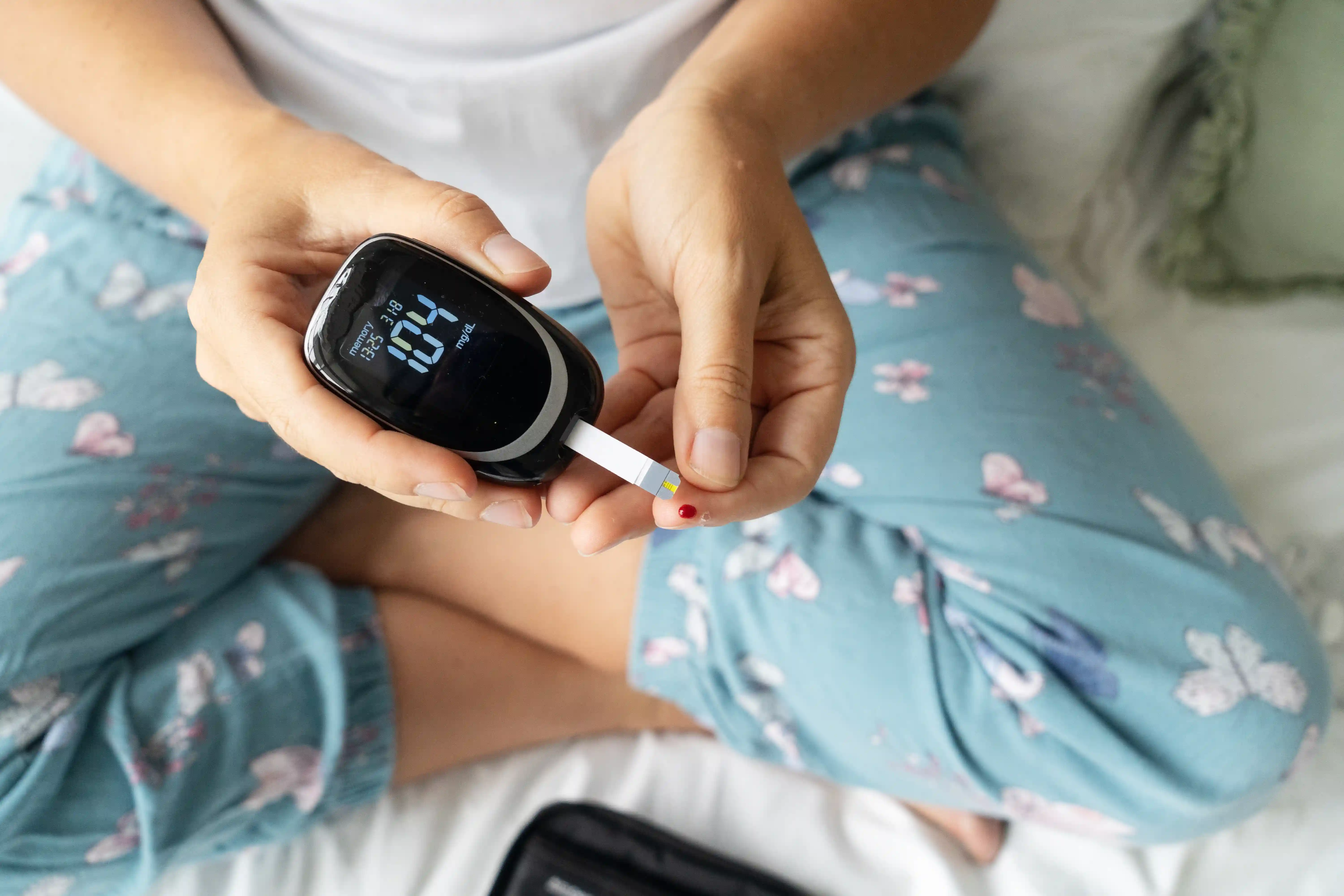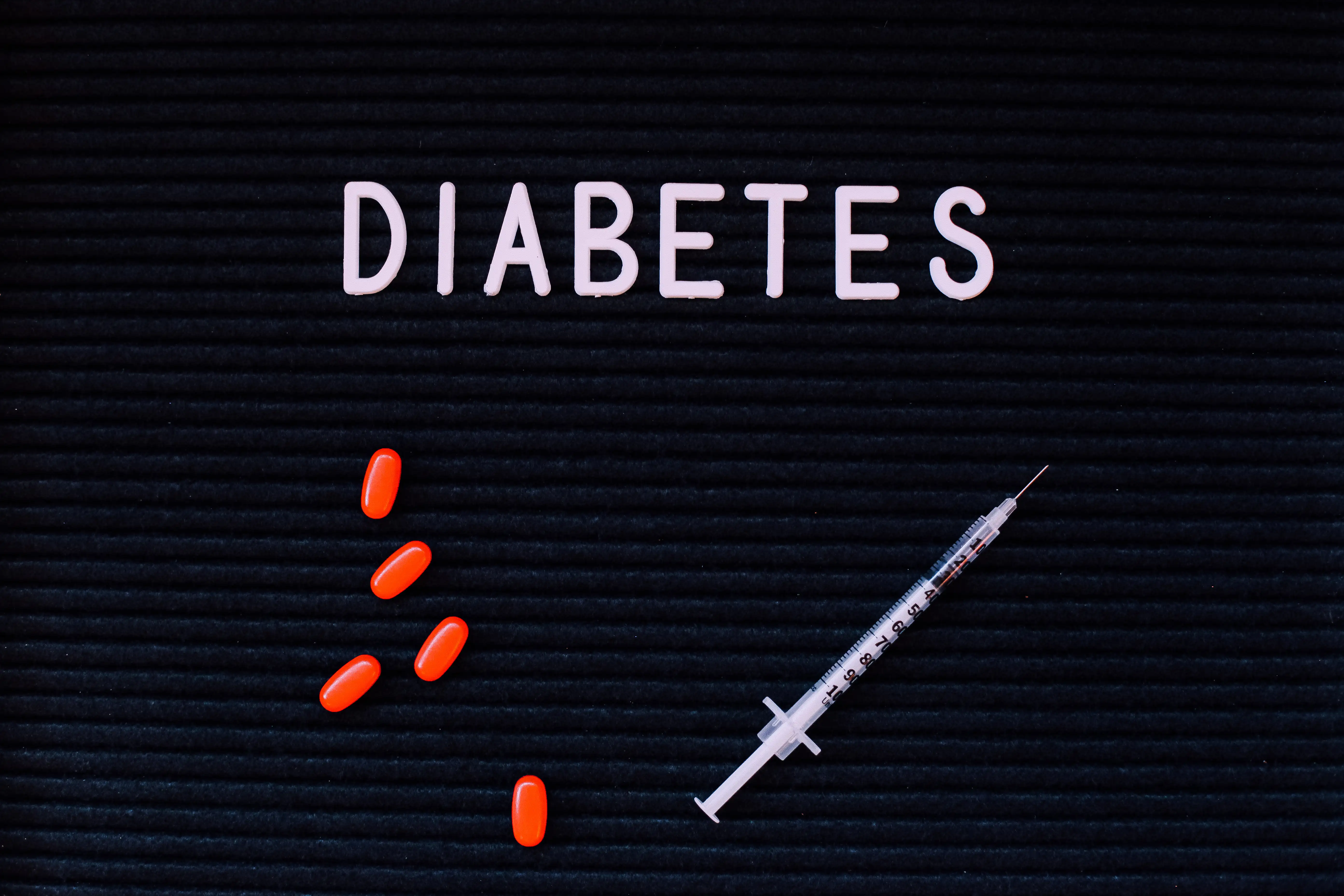Sleep is essential for both physical and mental health, yet many people underestimate its importance.
Diabetes is one of the most prevalent chronic conditions worldwide, affecting millions of individuals across different age groups. While it is well-known, understanding its underlying causes, risk factors, how sleep works and how it affects sleep is crucial for managing the condition effectively.
In this article, we will explore the different types of diabetes, the science behind it, and how lifestyle changes can play a pivotal role in managing the disease.
What is diabetes?
Diabetes is a chronic condition that affects how the body processes blood sugar (glucose). It occurs when the body either doesn’t produce enough insulin or the cells become resistant to it, preventing glucose from entering cells to be used as energy.
There are two main types: type 1 and type 2. Type 1 diabetes is typically diagnosed in childhood and is caused by an autoimmune response that destroys insulin-producing cells.
Type 2 diabetes, the more common form, develops over time and is often linked to lifestyle factors such as obesity and physical inactivity. Managing diabetes is essential to prevent complications like heart disease, kidney damage, and nerve issues.
The Science Behind Sleep and Metabolism

Sleep plays a crucial role in regulating metabolism by balancing hormones like insulin, ghrelin, and leptin, which control appetite and glucose use. Poor sleep can lead to insulin resistance, disrupted glucose metabolism, and weight gain. Ensuring quality sleep supports metabolic health and helps prevent conditions like diabetes.
Regulates Metabolic Processes
Sleep plays a vital role in regulating the body’s metabolic functions. During restful sleep, hormone levels such as cortisol, ghrelin, and leptin are balanced—these hormones control appetite, energy storage, and hunger cues.
Adequate sleep supports efficient energy use and helps maintain a healthy weight, while disruptions in sleep can lead to overeating, slower metabolism, and increased fat storage.
Insulin Sensitivity
Quality sleep enhances the body’s sensitivity to insulin, the hormone that helps cells absorb glucose for energy. When you get enough restful sleep, your body responds more effectively to insulin, keeping blood sugar levels stable.
Poor sleep, on the other hand, reduces this sensitivity, making it harder for the body to regulate glucose—one of the key factors in the development of type 2 diabetes.
Sleep Deprivation and Insulin Resistance
Lack of sleep—even over just a few nights—can trigger physiological changes that impair insulin function. This leads to insulin resistance, where cells no longer respond to insulin properly and more of it is needed to manage blood sugar. More on how sleep deprivation affects blood sugar levels is discussed in the next section.
Impact of Sleep Loss on Glucose Metabolism
When sleep is restricted, the body’s ability to manage glucose is disrupted. Sleep deprivation leads to higher blood sugar levels in the morning due to increased glucose production by the liver and reduced glucose uptake by muscle cells.
How Lack of Sleep Affects Blood Sugar Levels

Sleep is more than just rest—it’s a critical process for metabolic regulation. When sleep is cut short or disrupted, the body struggles to manage blood sugar efficiently.
Over time, this can lead to serious complications, especially for those already at risk of diabetes. Understanding how sleep loss affects insulin, hormones, and eating behaviors helps highlight why proper rest is essential for blood sugar control.
Increased Risk of Insulin Resistance
When you don’t get enough sleep, your body’s ability to use insulin efficiently is compromised. This makes it harder for cells to absorb glucose from the bloodstream, leading to elevated blood sugar levels. Over time, this resistance to insulin can significantly increase the risk of developing type 2 diabetes.
Elevates Cortisol Levels
Sleep deprivation triggers the release of cortisol, the body’s primary stress hormone. Elevated cortisol levels can cause the liver to release more glucose into the bloodstream, further disrupting blood sugar balance. Chronic stress combined with poor sleep can create a cycle that worsens glucose control.
Affects Hunger Hormones
Poor sleep disrupts the hormones that regulate appetite—ghrelin and leptin. Ghrelin (which increases hunger) rises, while leptin (which signals fullness) drops. This hormonal imbalance can lead to increased cravings, particularly for sugary or high-carb foods, which negatively impacts blood sugar levels.
Leads to Poor Dietary Choices
When you're tired, your brain's reward centers become more active, making you more likely to reach for quick energy sources like junk food or sugary snacks. This behavior, combined with metabolic changes from sleep loss, can lead to blood sugar spikes and poor long-term dietary habits.
Diabetes and Sleep Disorders
People with diabetes are more likely to experience sleep disturbances due to blood sugar fluctuations and diabetes-related complications.
At the same time, poor sleep can worsen diabetic symptoms, creating a two-way relationship. Recognizing common sleep disorders linked to diabetes can lead to more effective treatment plans and better overall health outcomes.
Sleep Apnea
Obstructive sleep apnea is common in people with type 2 diabetes. This condition causes repeated pauses in breathing during sleep, leading to poor oxygenation and fragmented rest.
Sleep apnea is linked to insulin resistance and elevated blood sugar, creating a dangerous feedback loop that complicates diabetes management. There are certain sleeping positions that can prevent sleep apnea, though.
Insomnia
Difficulty falling or staying asleep can lead to chronic sleep deprivation, which disrupts glucose metabolism and increases inflammation.
For people with diabetes, insomnia may make it harder to maintain consistent blood sugar levels and can contribute to fatigue and poor mood, further complicating disease control.
Restless Legs Syndrome (RLS)
RLS causes uncomfortable sensations in the legs and an uncontrollable urge to move them, especially at night. It is more common in people with diabetes due to nerve damage or poor circulation. The resulting sleep disturbance can worsen blood sugar regulation and reduce quality of life.
Signs and Symptoms of Sleep Deprivation

When you don’t get enough rest, your body and mind start to show clear signs of strain. Recognizing these symptoms early can help you take steps to improve sleep quality and overall health.
Fatigue and Difficulty Concentrating
One of the most immediate effects of poor sleep is constant tiredness. You may struggle to stay alert, process information, or complete tasks that normally feel easy. This mental fog can impact productivity, memory, and decision-making throughout the day.
Mood Swings and Irritability
Lack of sleep affects emotional regulation, making you more prone to mood swings, anxiety, and irritability. Even minor annoyances may feel overwhelming, and prolonged sleep deprivation has been linked to increased risk of depression and other mood disorders.
Weakened Immune System
Sleep is when your body repairs and strengthens its defenses. Without enough rest, your immune system weakens, making you more susceptible to infections, illnesses, and slower recovery times.
Increased Cravings and Weight Gain
Sleep deprivation disrupts appetite-regulating hormones, often leading to intense cravings—especially for sugary and high-carb foods. This can result in overeating, poor dietary choices, and unwanted weight gain, all of which can contribute to metabolic issues like diabetes.
How to Improve Sleep for Better Blood Sugar Control
Good sleep isn't just about feeling rested—it’s also a vital part of regulating blood sugar levels and supporting overall metabolic health. By building healthy sleep habits and addressing potential obstacles, individuals can improve both the quality of their sleep and their ability to manage diabetes more effectively.
Establish a Consistent Sleep Schedule
Going to bed and waking up at the same time every day helps regulate your body’s internal clock, which supports better hormonal balance and glucose regulation.
Create a Relaxing Bedtime Routine
Winding down with calming activities like reading, gentle stretching, practicing yoga or deep breathing can ease the transition into sleep and reduce nighttime stress that may affect blood sugar.
Optimize Your Sleep Environment
A dark, quiet, and cool room promotes deeper, more restorative sleep. Consider blackout curtains, white noise machines, or comfortable bedding to enhance sleep quality.
Manage Blood Sugar Before Bed
Check your blood sugar levels before sleeping and avoid heavy or high-carb meals close to bedtime. Stable blood sugar reduces nighttime awakenings and improves sleep continuity.
Reduce Screen Time Before Bed
Blue light from phones, tablets, and TVs can suppress melatonin production, making it harder to fall asleep. Powering down screens at least an hour before bed can help.
Monitor Diet and Exercise
Regular physical activity and a balanced diet support healthy sleep and stable blood sugar. However, avoid intense exercise or large meals right before bedtime.
Treat Underlying Sleep Disorders
Conditions like sleep apnea or restless legs syndrome can disrupt sleep and worsen blood sugar control. If you suspect a sleep disorder, consult a healthcare provider for diagnosis and treatment.
FAQs
How much sleep should I aim for each night?
Most adults should aim for 7-9 hours of sleep per night. This range allows for optimal rest and recovery, supporting metabolic health and reducing the risk of diabetes.
Can taking naps help compensate for lack of sleep at night?
While short naps (20-30 minutes) can help boost alertness and mood, they should not replace adequate nighttime sleep. Consistent, restful sleep during the night is essential for proper metabolic functioning.
Is there a specific diet that can improve both sleep and blood sugar levels?
A diet rich in fruits, vegetables, whole grains, and lean proteins can support both sleep quality and blood sugar management. Foods high in magnesium and tryptophan, such as bananas, nuts, and seeds, can also promote better sleep.
Can improving sleep help manage diabetes without changing medication?
Improving sleep can have a positive impact on managing diabetes, especially in conjunction with a healthy diet and exercise. While medication is essential for managing blood sugar in many cases, improving sleep can enhance insulin sensitivity and help maintain better glucose control. It is always important to consult a healthcare provider before making changes to your management plan.
Conclusion
Managing diabetes requires more than just medication—it involves a comprehensive approach that includes proper nutrition, regular exercise, and understanding the body’s response to insulin. By educating yourself about diabetes and adopting healthy lifestyle habits, you can take control of your health and minimize the risks associated with the disease.
If you or a loved one is dealing with diabetes, it's essential to work closely with healthcare providers to develop a personalized management plan.
Karen Barnard
Karen is a Human Movement Science expert and a certified sports nutrition and massage therapist. At Sleepiverse, she combines her passion for human movement science and sleep health to educate herself and her readers about healthier sleep. In addition to writing articles, Karen manages a fitness studio offering private training, athletic conditioning, and sports massage therapy. She focuses on providing people with a holistic environment for people to reach their health goals, often incorporating stretch therapy to promote mental tranquillity and help people improve their sleep.


